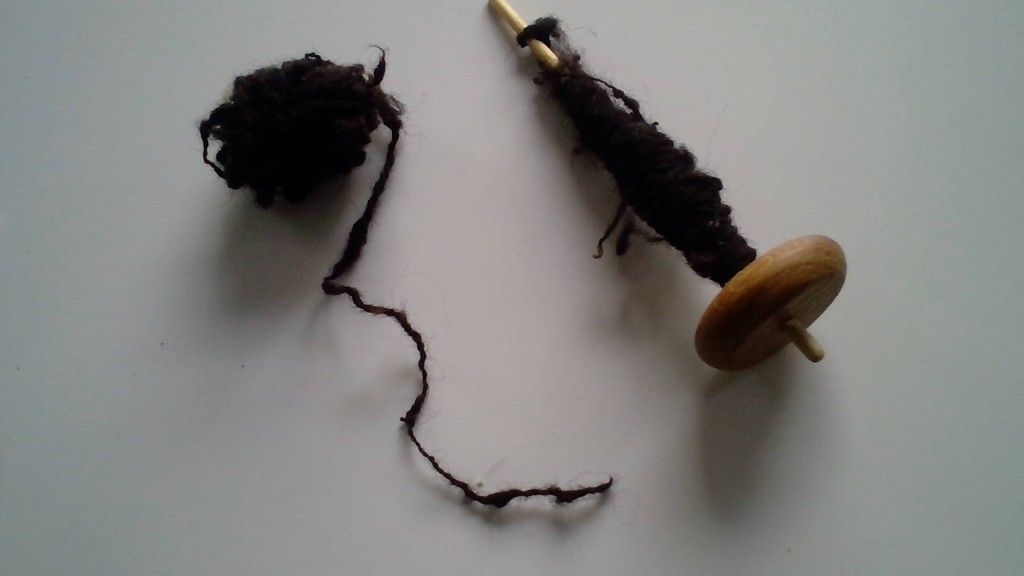(Nimue)

I’ve always been interested in spinning, even as a child. About ten years ago I had a fleeting experience, which led to being told in no uncertain terms that I could not spin and would not be able to spin. The problem, apparently, was that I was far too tense, and only relaxed people can spin well – or I was informed.
Back in March I bought a drop spindle. I saw one at a re-enactment event, and decided I could have a go. Even if I couldn’t get anywhere, it would be a nice item to add to the living history side of what we do.
On the Saturday at Chesters Fort, I settled down to learn. There were a lot of muttered swears on that first day as I tried, slowly and ineptly, to put theory into practice. I wasn’t very good at the beginning. People often aren’t automatically good at things they are new to.
I kept at it – for hours, over nine days, and I made some progress. I’m still not brilliant, but I’ve not been doing it very long. During the week a few women approached me – a few who were also spinners, a few who had tried and could not get to grips with it. They were all encouraging and made me feel like I was making progress. It’s not the easiest thing to get to grips with, evidently.
When I have other hats on and am getting people to sing, I regularly run into people who have been told that they can’t. The overwhelming majority of them can, and have the potential to be really good if they put in the time and effort. Being good at something does not depend on being able to do it effortlessly and immediately. Most of us need some time to learn new skills.
I have thoughts about people who call themselves teachers, but can only teach people who are naturally gifted. That isn’t teaching at all. Helping people learn means being able to take on those who are not instantly brilliant and show them how to grow, giving them tools and support. Real teaching doesn’t reject you at the outset for not being good enough. That’s gatekeeping, not helping people.
Whatever you try, know that it is fine not to be perfect. You do not have to magically know how to do everything. It’s ok to learn by trial and error and to make mistakes. It’s also absolutely fine to do something because it appeals to you – how good you are doesn’t really matter if the process gives you joy. Generally speaking, people get better at things with time and practice, but it’s also ok to just be at a level that makes you happy. We don’t have to be constantly working at everything.


I’m mostly self-taught with everything I do, so I’m mostly isolated from people telling me I can’t do things. But I did have a related experience; in CDT (Craft Design and Technology) lessons at school we were shown how to do various things and sent off to do them, but without much by way of support or feedback. I found most things I tried to make came out shoddy and misshapen, so I was pretty resigned to just thinking I was somehow rubbish at this stuff.l, which made me quite sad at the time.
But over the years I’ve realised that the mistakes I was making could have been easily fixed if the teacher had paid attention to how I was doing. I’ve gained those skills now, and have found I can actually enjoy making things I can be proud of. It’s such a shame that I missed out on all those years and the hit to my self confidence, when ten minutes from a teacher could hwve saved me!
Yes! Looking back I had a lot of experiences of being told what to do, and precious few of being actually taught how to do it. I coped with the more academic content, but like you was left feeling like I had no practical capacity at all.